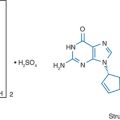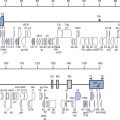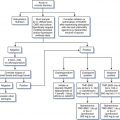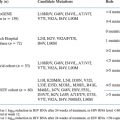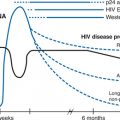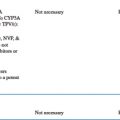Chapter 80 AIDS-Related Medications
INDEX OF MEDICATIONS
| Antiretrovirals | 1408 |
| Abacavir | 1408 |
| Amprenavir | 1409 |
| Atazanavir | 1409 |
| Darunavir | 1410 |
| Delavirdine | 1410 |
| Didanosine | 1410 |
| Efavirenz | 1411 |
| Emtricitabine | 1412 |
| Enfuvirtide | 1412 |
| Fosamprenavir | 1412 |
| Indinavir | 1413 |
| Lamivudine | 1413 |
| Lopinavir/Ritonavir | 1414 |
| Maraviroc | 1414 |
| Nelfinavir | 1415 |
| Nevirapine | 1415 |
| Ritonavir | 1416 |
| Saquinavir | 1416 |
| Stavudine | 1417 |
| Tenofovir Disoproxil Fumarate | 1417 |
| Tipranavir | 1417 |
| Zidovudine | 1418 |
| Dosing of Antiretrovirals in the Presence of Renal or Hepatic Insufficiency in Adult HIV Patients | |
| Antimycobacterial Drugs | 1422 |
| Amikacin | 1422 |
| Azithromycin | 1422 |
| Clarithromycin | 1422 |
| Ethambutol | 1423 |
| Isoniazid | 1423 |
| Moxifloxacin | 1424 |
| Pyrazinamide | 1424 |
| Rifabutin | 1424 |
| Rifampin | 1425 |
| Streptomycin | 1425 |
| Agents for Treatment of Pneumocystis Jiroveci (Carinii) Pneumonia (PCP) and Toxoplasma Gondii Infections | 1426 |
| Atovaquone | 1426 |
| Clindamycin | 1426 |
| Dapsone | 1426 |
| Pentamidine | 1427 |
| Primaquine Phosphate | 1427 |
| Pyrimethamine | 1428 |
| Sulfadiazine | 1428 |
| Trimethoprim/Sulfamethoxazole | 1428 |
| Antifungal Agents | 1429 |
| Amphotericin B | 1429 |
| Anidulofungin | 1429 |
| Caspofungin | 1430 |
| Clotrimazole | 1430 |
| Fluconazole | 1430 |
| Flucytosine | 1431 |
| Itraconazole | 1431 |
| Ketoconazole | 1432 |
| Micafungin | 1432 |
| Nystatin | 1432 |
| Voriconazole | 1432 |
| Anticytomegalovirus, Antiherpes Simplex Virus, and Antivaricella-Zoster Virus Agents | 1433 |
| Acyclovir | 1433 |
| Cidofovir | 1434 |
| Famciclovir | 1434 |
| Foscarnet | 1435 |
| Ganciclovir | 1435 |
| Valacyclovir | 1436 |
| Valganciclovir | 1436 |
| Hepatitis B and Hepatitis C Treatment | 1436 |
| Adefovir Dopivoxil | 1436 |
| Entecavir | 1437 |
| Interferon-alfa 2b | 1437 |
| Peginterferon-alfa 2a | 1438 |
| Peginterferon-alfa 2b | 1438 |
| Ribavirin | 1438 |
| Biologics Miscellaneous | 1439 |
| Darbepoietin | 1439 |
| Erythropoietin | 1439 |
| Filgrastim | 1439 |
| Miscellaneous – Other Medications | 1440 |
| Albendazole | 1440 |
| Paromomycin | 1440 |
DEFINITIONS OF FDA PREGNANCY RISK FACTOR CATEGORIES
| Abbreviations | |
| AUC | Area under the concentration–time curve |
| Cmax | Maximum concentration |
| CMV | Cytomegalovirus |
| CrCl | Creatinine clearance |
| CNS | Central nervous system |
| CSF | Cerebrospinal fluid |
| EC | enteric coated |
| GI | Gastrointestinal |
| HSV | Herpes simplex virus |
| IM | Intramuscular |
| IV | Intravenous |
| LFTs | Liver function tests |
| MAC | Mycobacterium avium complex |
| OTC | Over the counter |
| PCP | Pneumocystis jiroveci (carinii) pneumonia |
| SC | Subcutaneous |
| t1/2 | Half-life |
| Tmax | Time to maximum concentration |
| Toxo | Toxoplasmosis |
| USPHS | US Public Health Service |
| VZV | Varicella-zoster virus |
Prices listed are approximate and based on 2005 average wholesale price (AWP).
ANTIRETROVIRALS
Abacavir (ABC)
Trade name: Ziagen (GlaxoSmithKline)
| Available formulations: | |
| 300 mg tablets | $7.46 |
| 20 mg/mL oral solution, 240 mL | $117.71 |
| Epzicom (abacavir 600 mg/lamivudine 300 mg) | $26.03 |
| Trizivir (abacavir 300 mg/lamivudine 150 mg/zidovudine 300 mg) | $19.50 |
Class: Nucleoside reverse transcriptase inhibitor
As Ziagen: Abacavir 300 mg twice daily or 600 mg once daily
As Epzicom: One tablet once daily
As Trizivir: One tablet twice daily
Children (3 months):–8 mg/kg (max 300 mg) twice daily
Storage and stability: Store at room temperature; oral solution may be refrigerated; do not freeze
Pharmacokinetics
Plasma half-life: 0.9–1.5 h (intracellular 12–26 h)
CSF penetration: Approximately 18% of plasma concentration
Plasma protein binding: Approximately 50%
Metabolism/elimination: Primarily metabolized by alcohol dehydrogenase and glucuronyl transferase
Food effects: Can be taken without regard to meals
Amprenavir (APV)
Trade name: Agenerase (GlaxoSmithKline)
Available formulations (150 mg capsule formulation is no longer available):
| 50 mg capsule | $0.54 |
| 15 mg/mL oral solution, 240 mL | $38.77 |
Note: Oral solution contains propylene glycol, not recommended in children less than 4-years old, pregnant women, patients with renal or liver failure, and patients on metronidazole or disulfiram.
Class: Protease inhibitor (PI)
Oral solution: 1400 mg (93.3 mL) twice daily
Capsules: <50 kg: 20 mg/kg twice daily or 15 mg/kg three times daily
Solution: <50 kg: 22.5 mg/kg twice daily or 17 mg/kg three times daily
Capsules and oral solution doses are not interchangeable on a milligram per milligram basis
Storage and stability: Store at room temperature
Atazanavir (ATV)
Trade name: Reyataz (Bristol-Myers Squibb)
| Available formulations: | |
| 100 mg | $14.29 |
| 150 mg | $14.29 |
| 200 mg | $14.29 |
| 300 mg | $28.57 |
Adults: Treatment-naive patients: 400 mg once daily
Children: Not approved for use in children
Storage and stability: Store at room temperature
Darunavir (Prezista™)
Adults: 600 mg bid + ritonavir 100 mg bid (treatment-experienced)
Storage and stability: Tablets stable at room temperature.
Delavirdine
Trade name: Rescriptor (Agouron)
| Available formulations: | |
| 100 mg tablets | $0.88 |
| 200 mg tablets | $1.76 |
Class: Non-nucleoside reverse transcriptase inhibitor
Oral dose (adults): 400 mg three times daily
Storage and stability: Keep in tightly closed container at room temperature away from high humidity
Didanosine (ddI)
Trade name: Videx and Videx EC (Bristol-Myers Squibb); generic enteric-coated didanosine
| Available formulations: | |
| 25 mg buffered tablets | $0.47 |
| 50 mg buffered tablets | $0.95 |
| 100 mg buffered tablets | $1.89 |
| 150 mg buffered tablets | $2.84 |
| 200 mg buffered tablets | $3.79 |
| 2 g/100 mL pediatric powder | $34.70 |
| 4 g/200 mL pediatric powder | $78.61 |
| 100 mg sachet | $1.89 |
| 167 mg sachet | $3.16 |
| 250 mg sachet | $4.74 |
| 125 mg EC capsules | $3.60 |
| 200 mg EC capsules | $4.96 |
| 250 mg EC capsules | $6.19 |
| 400 mg EC capsules | $9.91 |
Class: Nucleoside reverse transcriptase inhibitor
>60 kg: 400 mg once daily on an empty stomach
<60 kg: 250 mg once daily on an empty stomach
>60 kg: 200 mg twice daily or 400 mg once daily on an empty stomach
<60 kg: 125 mg twice daily or 250 mg once daily on an empty stomach
>60 kg: 250 mg twice daily on an empty stomach
<60 kg: 167 mg twice daily on an empty stomach
Mix with 4 ounces of water; stir until dissolved
Oral dose suspension (children):
Age 2 weeks to 8 months: 100 mg/m2 twice daily
Age > 8 months: 120 mg/m2 twice daily
Suspension is dissolved in water and then mixed with equal amount of antacid
EC capsules: Store at room temperature
Sachet: Store at room temperature. If dissolved in water, stable for 4 h at room temperature
Pharmacokinetics
Bioavailability: Buffered tablet and EC capsule 40%; sachet 30%
Plasma half-life: 1.6 h (Intracellular >20 h)
CSF penetration: 21% of serum concentration (children 46%)
Plasma protein binding: Less than 5%
Metabolism/elimination: Primarily eliminated by renal excretion
Food effects: Requires administration on empty stomach, at least 30 min before or 2 h after a meal
Efavirenz (EFV)
Trade name: Sustiva (Bristol-Meyers Squibb)
| Available formulations: | |
| 50 mg capsules | $1.33 |
| 100 mg capsules | $2.66 |
| 200 mg capsules | $5.33 |
| 600 mg tablets | $15.98 |
| Atripla (efavirenz 600 mg/emtricitabine 200 mg/tenofovir 300 mg) | $47.95 |
Class: Non-nucleoside reverse transcriptase inhibitor
Adults: 600 mg once daily, recommended to be given at bedtime or before bedtime on an empty stomach.
As Atripla: One tablet at bedtime or before bedtime on an empty stomach
Children (3 years of age or older):
| Weight (lbs) | Dose (mg) |
|---|---|
| 22 to <33 | 200 |
| 33 to <44 | 250 |
| 44 to <55 | 300 |
| 55 to <71.5 | 350 |
| 71.5 to <88 | 400 |
| ≥88 | 600 |
Storage and stability: Store at room temperature
Emtricitabine (FTC)
Trade name: Emtriva (Gilead Sciences)
| Available formulations: | |
| 200 mg capsule | $10.60 |
| 10 mg/mL oral solution 170 mL | $81.96 |
| Truvada (FTC 200 mg/tenofovir 300 mg) | $26.03 |
| Atripla (efavirenz 600 mg/emtricitabine 200 mg/tenofovir 300 mg) | $47.95 |
Class: Nucleoside reverse transcriptase inhibitor active against HIV and hepatitis B
Adults: 200 mg capsule once daily or 240 mg oral solution (24 mL) once daily
As Atripla: One tablet at bedtime or before bedtime on an empty stomach
Storage and stability: Store at room temperature
Enfuvirtide (T20)
Trade name: Fuzeon (Hoffmann-LaRoche)
| Available formulations: | |
| Single-use vial of 108 mg enfuvirtide, to be reconstituted with 1.1 mL sterile water for delivery of 90 mg/1 mL | $35.29 |
Adults: 90 mg (1 mL) subcutaneous (SC) injection twice daily
Fosamprenavir (f-APV)
Trade name: Lexiva (GlaxoSmithKline)
| Available formulations: | |
| 700 mg tablet | $11.09 |
| 50 mg/mL oral suspension, 225 mL |
Adult treatment-naive patients:
(f-APV1400 mg + ritonavir 200 mg) once-daily OR
(f-APV 700 mg + ritonavir 100 mg) twice daily
Adult treatment-experienced patients:
f-APV 700 mg twice daily + ritonavir 100 mg twice daily
30 mg/kg twice daily, not to exceed 1,400 mg twice daily
30 mg/kg twice daily not to exceed 1,400 mg twice daily or
18 mg/kg plus ritonavir 3 mg/kg twice daily not to exceed 700 mg + ritonavir 100 mg twice daily
Therapy-experienced ≥ 6 Years of Age:
Storage and stability: Store at room temperature
Indinavir (IDV)
| Available formulations: | |
| 100 mg | $0.76 |
| 200 mg | $1.52 |
| 333 mg | $2.54 |
| 400 mg | $3.05 |
800 mg every 8 h on an empty stomach, OR
IDV 800 mg + ritonavir (100 or 200 mg) twice daily with or without food
Lamivudine (3TC)
Trade name: Epivir (GlaxoSmithKline)
| Available formulations: | |
| 150 mg tablet | $5.55 |
| 300 mg tablet | $11.11 |
| 10 mg/mL, 240 mL oral solution | $88.86 |
| Combivir (3TC 150 mg + zidovudine 300 mg) | $12.04 |
| Epzicom (3TC 300 mg + ABC 600 mg) | $26.03 |
| Trizivir (3TC 150 mg + ABC 300 mg + zidovudine 300 mg) | $19.05 |
Class: Nucleoside reverse transcriptase inhibitor active against HIV and HBV
Adults: 150 mg twice daily or 300 mg once daily
Neonatal/infants (<30 days): 2 mg/kg twice daily
Pediatric (<50 kg): 4 mg/kg twice daily (up to 150 mg twice daily)
Storage and stability: Store at room temperature in tightly closed containers
Pharmacokinetics
Tmax: Approximately 1 h (fasting), 3.2 h (fed)
Bioavailability: 86% (66–68% in children)
Half-life: 5–7 h (intracellular 18–22 h)
Plasma protein binding: Less than 36%
Metabolism/elimination: Primarily eliminated unchanged in the urine
Food effects: Food delays absorption but not overall extent; give without regard to meals
Lopinavir/Ritonavir (LPV/RTV)
| Available formulations: | |
| Lopinavir 200 mg + ritonavir 50 mg tablet | $6.64 |
| Lopinavir 80 mg/ritionavir 20 mg/mL oral solution, 180 mL | $351.75 |
Children (6 months to 12 years):
| 7 to <15 kg | 12/3 mg/kg twice daily |
| 15 to 40 kg | 10/2.5 mg/kg twice daily |
| >40 kg | Use adult dose |
Maraviroc
Trade name: Selzentry (Pfizer)
Mechanism of Action: CCR5 Antagonist
| When given with strong CYP3A inhibitors (with or without CYP3A inducers), including protease inhibitors (except tipranavir/ritonavir) and delavirdine | 150 mg twice daily |
| With NRTIs, tipranavir/ritonavir, nevirapine and other drugs that are not strong CYP3A inhibitors or CYP3A inducers | 300 mg twice daily |
| With CYP3A inducers including efavirenz (without a strong CYP3A inhibitor) | 600 mg twice daily |
Storage and stability: Room temperature
Nelfinavir (NFV)
Trade name: Viracept (Agouron)
| Available formulations: | |
| 250 mg tablet | $2.52 |
| 625 mg tablet | $6.05 |
| 50 mg/g oral powder, 144 g | $66.48 |
Adults: 750 mg three times daily or 1250 mg twice daily with food
Children (≤2 years): 45–55 mg/kg twice daily with food or 25–35 mg/kg three times daily with food
Storage and stability: Oral powder may be mixed with water, milk/formula, soy milk/formula, and dietary supplements. Mixed powder may be stored in refrigerator up to 6 h. Store tablets at room temperature
Nevirapine (NVP)
Trade name: Viramune (Boeringer-Ingelheim)
| Available formulations: | |
| 200 mg tablet | $12.97 |
| 10 mg/mL suspension, 240 mL | $91.98 |
Class: Non-nucleoside reverse transcriptase inhibitor
Adults: 200 mg once daily for 14 days, then 200 mg twice daily
2 months to <8 years: 4 mg/kg once daily 3 14 days, then 7 mg/kg twice daily
≥ 8 years: 4 mg/kg once daily 3 14 days, then 4 mg/kg once daily (max 200 mg twice a day)
Storage and stability: Store at room temperature in tightly closed bottles
Ritonavir (RTV)
| Available formulations: | |
| 100 mg capsule | $10.29 |
| 80 mg/mL oral solution, 240 mL | $1728.24 |
Saquinavir (SQV)
| Available formulations: | |
| 200 mg hard gel capsule | $2.40 |
| 500 mg tablet | $5.99 |
Adults: Unboosted SQV not recommended
Recommended RTV-boosted dose: (SQV 1000 mg + RTV 100 mg) twice daily
Not approved for use in children
Storage and stability: Store at room temperature
Stavudine (d4T)
Trade name: Zerit (Bristol Myers Squibb)
| Available formulations: | |
| 15 mg capsule | $5.49 |
| 20 mg capsule | $5.70 |
| 30 mg capsule | $6.06 |
| 40 mg capsule | $6.17 |
| 1 mg/mL, 200 mL | $69.64 |
Class: Nucleoside reverse transcriptase inhibitor
>60 kg: 40 mg twice daily; <60 kg: 30 mg twice daily
Children: <30 kg: 1 mg/kg per dose every 12 h. Weight ≤30 kg, follow adult recommendations
Capsules: store at room temperature in tightly closed bottles
Tenofovir Disoproxil Fumarate (TDF)
| Available formulations: | |
| 300 mg tablet | $16.75 |
| Truvada (tenofovir 300 mg + emtricitabine 200 mg) | $26.03 |
| Atripla (efavirenz 600 mg/emtricitabine 200 mg/tenofovir 300 mg) | $47.95 |
Class: Nucleotide reverse transcriptase inhibitor with activities against HIV and HBV
Not approved for use in children
Storage and stability: Store at room temperature
Pharmacokinetics
Tmax: 1 h under fasting condition, and 2 h when taken with food
Bioavailability: 25% in fasting state; 39% with high-fat meal
Half-life: 17 h (intracellular >60 h)
Food effects: Take without regard to meals
Stay updated, free articles. Join our Telegram channel

Full access? Get Clinical Tree


